The Punk Rock Attitude
Punk rock is more than just music; it’s a philosophy and lifestyle. Rooted in a spirit of nonconformity and fueled by a desire to challenge the status quo, Punk became a powerful outlet for expressing discontent, dissatisfaction, and raw emotions.

Punk rock embraced a DIY (do-it-yourself) ethos, with bands frequently self-producing their recordings and distributing them through independent labels.
History of the Term "Punk Rock"
Although the punk rock movement emerged in the mid-1970s, the term "punk rock" has a longer history.
It first appeared in the late 16th century as a derogatory term for a prostitute.
By the 20th century, it was used more generally to describe a hoodlum or a troublemaker.
Music critics in the late 1960s and early 1970s began using "punk rock" to describe the raw, energetic music of garage rock bands from the mid-1960s.
This usage reflected the raw and rebellious spirit that these bands embodied, which anticipated the later punk rock movement.
Punk Rock is characterized by its straightforward three-chord structures, rapid tempos, and often confrontational lyrics addressing social and political issues. The genre is marked by a rejection of polished production in favor of a more unrefined and direct sound.
Musical Characteristics of Punk Rock
Punk rock music is generally minimalist, drawing inspiration from the straightforward musical arrangements of 1960s underground rock.
The typical punk band setup consists of one or two guitars, a bass, drums, and vocals. Songs are often short, fast-paced, and played with high energy.
While early punk retained the traditional verse-chorus structure of rock and roll, later punk bands often deviated from this format, experimenting with different song structures and tempos.
Exploring the Heartbeat of Punk Rocker Culture
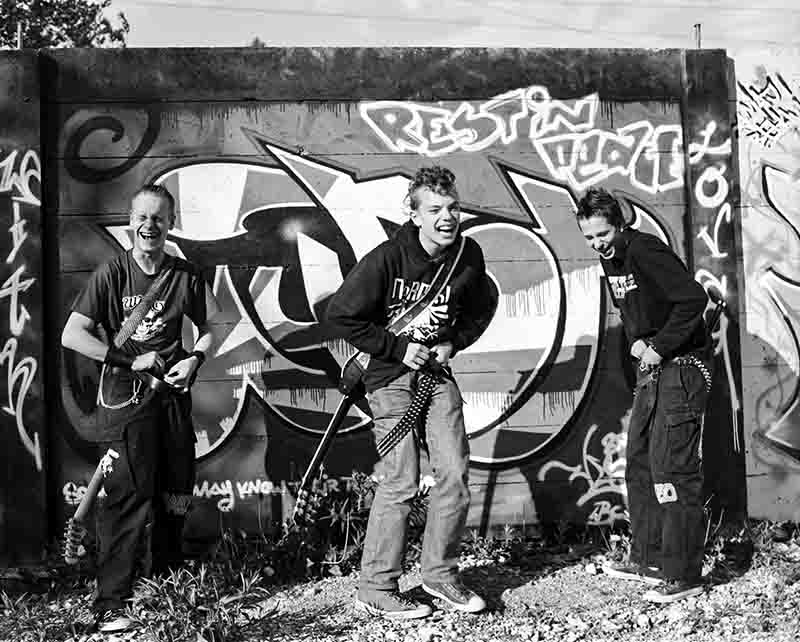
Punk music is characterized by its aggressive guitar riffs, simplistic chord structures, and lyrics that don't shy away from confronting authority.
Punk Rockers, within the cultural and musical landscape, are a multifaceted phenomenon that originated in the mid-1970s.
Punk encompasses a distinctive subculture and musical genre characterized by its rebellious spirit, anti-authoritarian stance, and a fervent DIY (do-it-yourself) ethos, and it's own punk fashion.
Punk Rock emerged as a reaction to the perceived excesses and pretensions of mainstream rock music.
Punk Timeline: From Proto-Punk Pioneers to Contemporary Punk
Bands like MC5, Death, Pure Hell, the Stooges, the New York Dolls, and the Ramones, laid the groundwork with their raw, energetic sound and anti-establishment attitude.
The confrontational spirit of earlier rock and roll was also an important influence.
Across the Atlantic, the UK saw the explosion of punk with bands like The Sex Pistols, The Clash, and The Damned.
Punk Rock quickly transcended its origins, spreading globally and giving rise to diverse subgenres.
| Year | Event |
|---|---|
| 1974 | Proto-Punk Roots: The term "punk rock" is often retroactively applied to bands like MC5, Death, The Stooges, and New York Dolls, laying the groundwork for the punk movement. |
| 1976 | Emergence of Punk Bands: The Ramones release their self-titled debut album, often considered the catalyst for punk rock. Other seminal punk bands like The Sex Pistols, The Damned, and The Clash form. |
| 1977 | Punk Goes Global: Punk rock gains international attention with the release of Sex Pistols' "Never Mind the Bollocks, Here's the Sex Pistols" and The Clash's self-titled debut. Punk scenes emerge in the UK, USA, and beyond. |
| 1978 | Post-Punk Era: Bands like Joy Division, Siouxsie and the Banshees, and The Cure explore post-punk, incorporating diverse influences into the punk aesthetic. |
| 1980s | Diversification of Punk: Subgenres like hardcore punk, post-punk, and pop-punk emerge, showcasing the adaptability and diversity of punk music. |
| 1982 | Decline of First Wave: The initial wave of punk begins to wane, but its influence persists, and underground scenes continue to thrive. |
| 1990s | Pop-Punk Resurgence: Pop-punk gains popularity with bands like Green Day, The Offspring, and Blink-182, bringing punk to mainstream audiences. |
| 2000s | Emo-Pop Punk Fusion: A blend of emo and pop-punk becomes popular, with bands like Fall Out Boy and My Chemical Romance achieving mainstream success. |
| 2009 | Detroit proto-punk rock band Death's 1975 album "For the whole world to see" is finally being released. |
| 2010s | Revival of Punk Spirit: Independent and underground punk scenes thrive globally, with bands like IDLES, The Interrupters, and others carrying the torch of punk ethos. |
| 2020s | Ongoing Evolution: Punk continues to evolve, with new subgenres, DIY movements, and a resurgence of interest in classic punk bands, ensuring the enduring impact of the genre. |
This timeline provides a snapshot of the major events and developments in the history of punk, highlighting its evolution, diversification, and ongoing relevance across decades.
Punk Rock Vibe: Prevalence and Evolution
Originating in both New York City and London, punk rock quickly spread to other parts of the world
The music club CBGBs introduced bands like the New York Dolls and the Ramones in the early 1970s.
The movement gained momentum through live performances, independent record releases, and DIY ethos.
As punk rock evolved, it branched out into numerous subgenres, including hardcore punk, anarcho-punk, Oi!, pop-punk, and others.
Each subgenre had its own distinct musical and lyrical characteristics, reflecting the diverse influences and perspectives within the broader punk movement.
Cultural Impact of Punk Rock
Beyond music, punk rock sparked a vibrant subculture characterized by distinctive clothing styles, hairstyles, and attitudes.
It has influenced fashion, as well as the fine arts, and attitudes towards individuality and self-expression.
Punk fashion involves ripped clothing, safety pins, leather jackets, and hairstyles like the mohawk.
Punk subculture represents a rebellion against mainstream culture and its perceived conformity.
The Punk Rock lifestyle provides a space for people to express their frustrations, anxieties, and desire for change.
Like a Punk Rocker
Dope was a short-lived punk rock band formed in Munich in 1995. The group gained notoriety in the English, Irish and Scottish communities of roadies, drunks, and fugitives of the Munich underground scene.
Punk Rock London Calling
After visiting the New York scene, Malcom McLaren was among the masterminds who brought the concept of Punk Rock to London.
In the beginning, punk was regular rock'n'roll or pub rock, except that it was played harsher and faster.
On July 4th, 1976, the Ramones played at The Roundhouse in London and ignited the emerging British punk movement.
They returned for a New Year's Eve show and live recording on December 31st 1977.
The resulting live double album "Ramones - It's alive" ranks as one of the finest live albums ever recorded.
Never mind the bollocks, here's the Sex Pistols
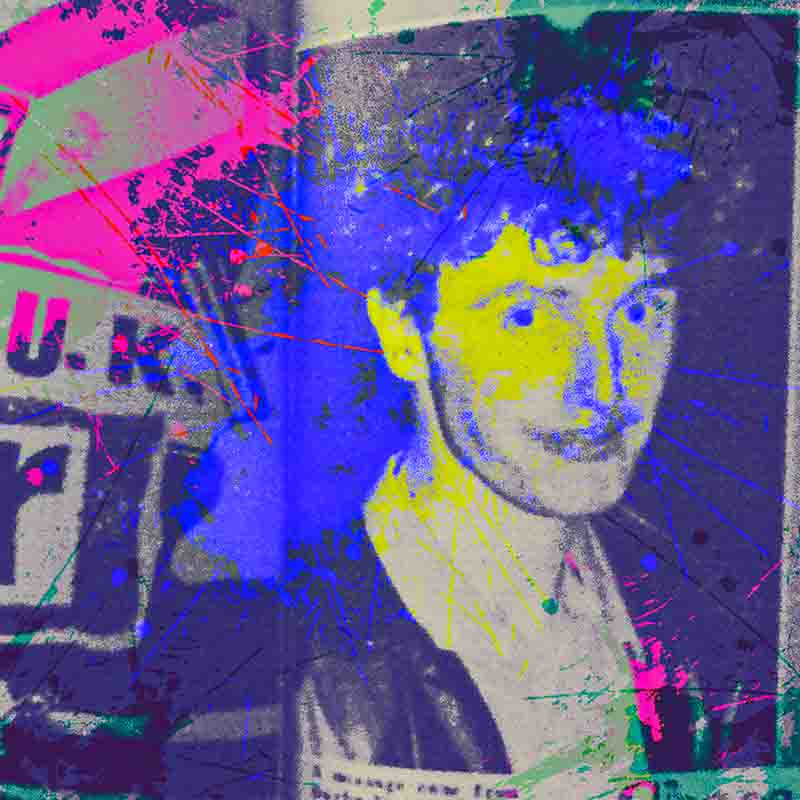
Malcolm McLaren's visual contributions to the punk rock movement were instrumental in shaping the image of punk as a powerful and provocative countercultural force. The cover of the Sex Pistols' "Never Mind the Bollocks, Here's the Sex Pistols" album, designed by Jamie Reid under McLaren's direction, is a classic example of punk's graphic rebellion.
Malcolm McLaren had a much broader vision with the Sex Pistols than merely forming a band.
His visionary schemes were instrumental in turning punk rock into a universal hype. However, his guided endeavour ultimately ended in destruction and disaster.
Having already planned a career for guitarist Steve Jones, he now sought a suitable vocalist and found the ideal candidate in John Lydon, the archetypal punk rock singer.
With the addition of drummer Paul Cook and bassist Glen Matlock, the band was completed and named "The Sex Pistols", in reference to McLaren and his girlfriend Vivienne Westwood's eccentric fashion boutique on London's King's Road.
After bassist Glen Matlock was replaced by Sid Vicious, events exploded and punk rock became a global cultural phenomenon.
With superbly orchestrated stunts and scandals, the Sex Pistols and their followers became the talk of the late 70s.
What is Punk Rock?
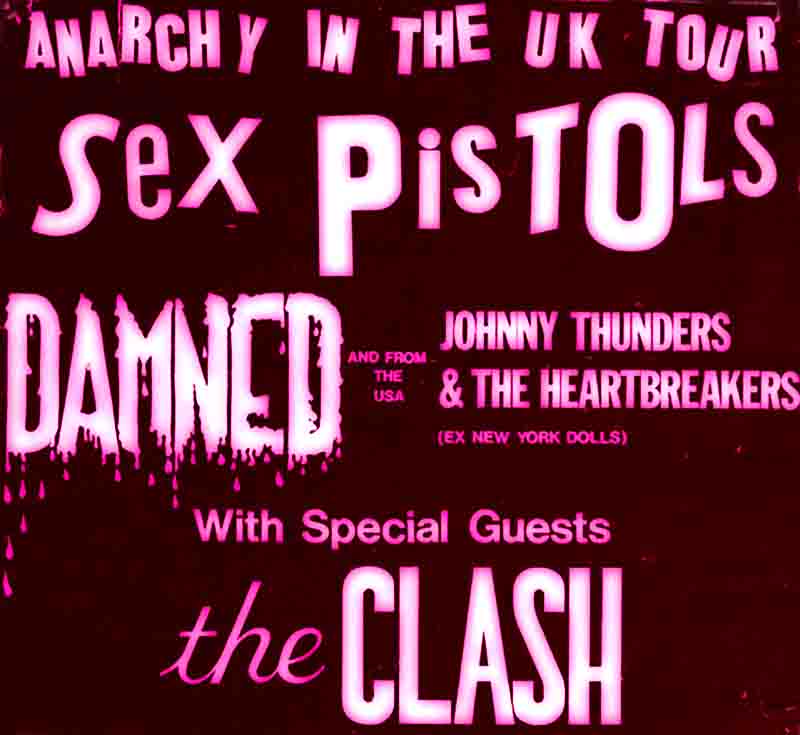
Despite the tour's relatively small number of gigs, its impact on the punk rock movement was profound. The "Anarchy in the UK Tour" served as a catalyst for punk's ascent into mainstream consciousness
The Depths of Punk: How Punk Redefined Music, Fashion, and Attitude

Punk fashion is more than just clothing; it's a visual rebellion. Torn clothing, leather jackets, and bold accessories are not just style choices but statements of defiance against mainstream aesthetics.
Out of the earliest gathering of London punks evolved the dominant acts of the following decade.
Among the regulars in the Sex Pistols' entourage were Siouxsie Sioux, Shane MacGowan, and William Michael Albert Broad aka Billy Idol.
Countless new bands playing raw guitar based music emerged along the lines of the punk ethos. It wasn't about mastering your instrument, but having a message.
In the course of this wave, legendary bands like The Clash emerged, which are regarded as one of the most significant bands in the history of recorded music to this day.
No future: Loud and Proud
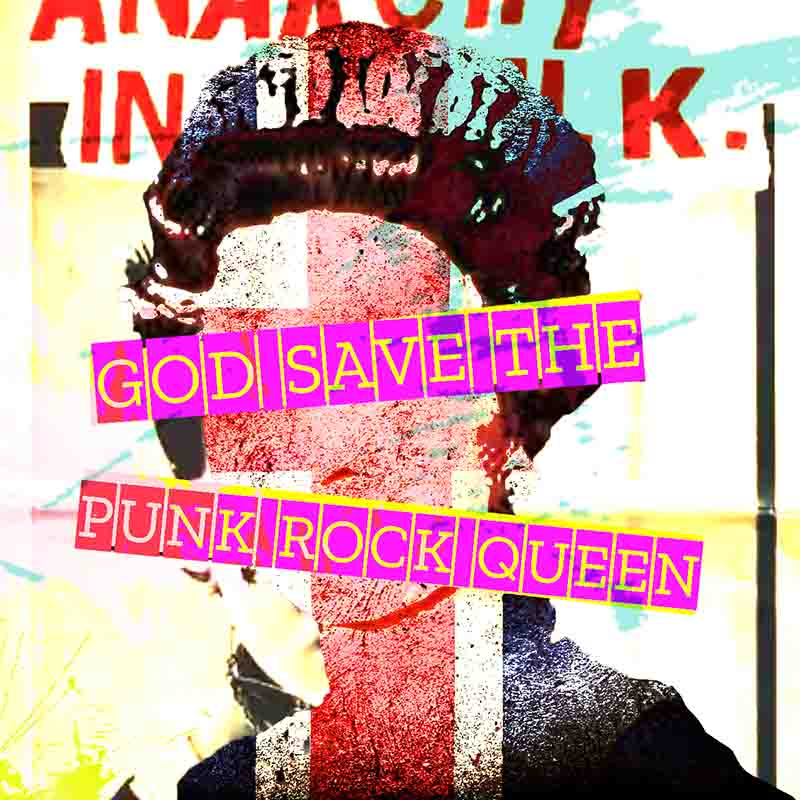
The song "God Save the Queen" was released during the Queen's Silver Jubilee in 1977, which celebrated her 25th year on the throne. The single's provocative title and lyrics, along with its controversial album artwork featuring the Queen with a safety pin through her nose, caused an uproar and led to censorship and bans by mainstream media outlets.
Punk Rock's rejection of conformity and its celebration of individuality had a profound impact.
It shattered the myth of the distant and unapproachable rock star, encouraging a more inclusive and participatory music culture.
Fans were no longer passive spectators; they became active participants, starting their own bands, forming communities, and contributing to the movement's growth.
Punk rock was highly ideological from the beginning. To be part of the inner circle it was necessary to be in Punk Rock fashion and, if needed, cut off one's long hair and sport a Punk Rock hairstyle.
This rigorous attitude created clear stereotypes. This went so far that Led Zeppelin, tongue in cheek, released their 1979 album "In through the out door" wrapped in a brown paper bag to avoid being seen in public with a Led Zeppelin album after exiting a record store.
Some musicians and rock stars of the so-called old guard publicly expressed themselves positively about punk rock and were therefore revered by punk fans.
Among them was Phil Lynott of Thin Lizzy, who founded a short lived musical project with Sex Pistol's Steve Jones.
One musician who truly grasped the balancing act between punk and rock was Lemmy Kilmister. His band Motörhead was adored by punks and rockers alike.
The result was a musical style that combined elements of punk and hard rock, paving the way for all heavy metal bands that followed.
Punk Rock's unapologetic political and social commentary rekindled the tradition of protest music.
It encouraged musicians to use their platform to address important issues, inspiring subsequent generations of artists to do the same.
Malcolm McLaren, pioneer of the creation of punk, erected a monument dedicated to himself and to punk rock in 1980 with the release of "The Great Rock'n Roll Swindle".
The documentary film and soundtrack of the same name, which featured Ronnie Biggs, mocked the music industry primarily.
At this point, the Sex Pistols had already broken up. Sid Vicious, the legendary bassist, had committed suicide in New York on February 2, 1979.
Johnny Rotten was John Lydon again and had formed a new band with P.I.L. (Public Image Ltd). The Clash had become a major arena act.
Punk's Not Dead
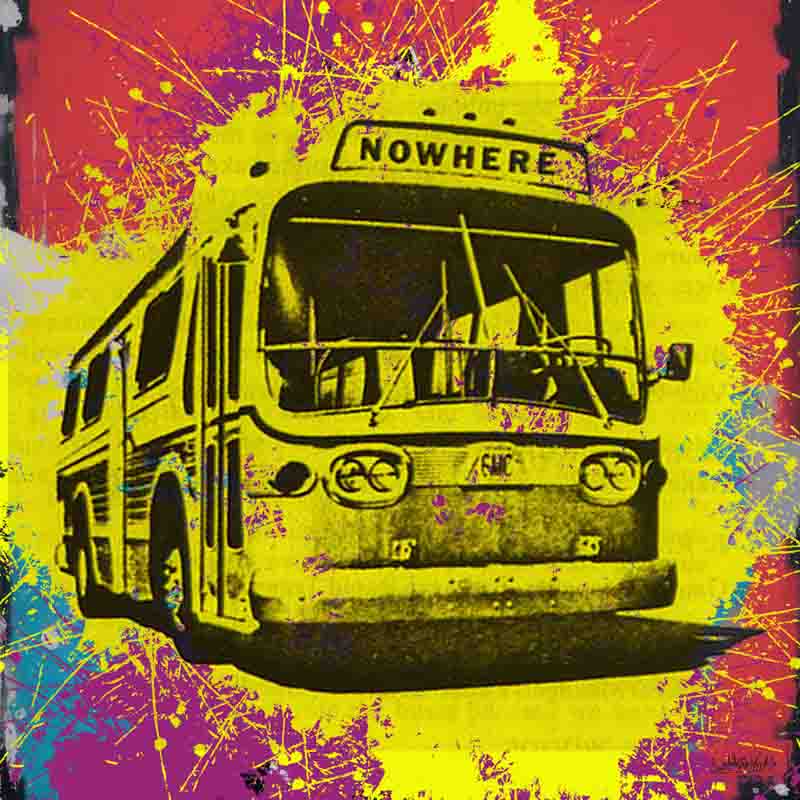
In 1979, Punk Rock had reached a critical juncture in its evolution. The movement that had emerged a few years earlier as a raw and rebellious countercultural force was now undergoing significant changes. The aggression and simplicity of early punk were giving way to more complex and experimental sounds.
But this self-destruction did not destroy punk rock; on the contrary, the dramatic and extreme events transformed punk rock from a musical genre and a trend into a myth that endures to this day.
Punk Rock's legacy of advocacy and social consciousness continues to influence musicians across genres, making music a powerful vehicle for expressing dissent and advocating for change
Punk Rock's bold and unconventional visual aesthetics, fashion choices, and artistic expressions have influenced various aspects of culture, including visual arts, fashion trends, and societal attitudes toward individuality and self-expression.
Punk Rock's philosophy of resistance, individuality, and empowerment has left a lasting impact on the music landscape and beyond.
Its legacy continues to inspire artists to break boundaries, challenge norms, and use their creativity to make a difference in the world.
As long as there are voices that dare to question, defy, and dream, the spirit of Punk Rock will endure, reminding us that music can be a powerful force for change and an expression of the human spirit's boundless potential.
Definition and Origins of Punk Rock
-
Defining Punk Rock: At its core, Punk Rock is characterized by its simplicity, aggressive sound, and direct, often confrontational, lyrics. The music is often fast-paced, with distorted guitars, pounding drums, and energetic vocals that exude a sense of urgency and defiance.
-
The Birthplace: Punk Rock's origins can be traced back to the underground music scenes of New York City, with bands like the Ramones, and London, with bands like the Sex Pistols, The Damned, and The Clash. These early pioneers laid the foundation for the movement's anti-establishment ethos and attitude.
The History of Punk Rock: From the '70s to the Present:

Punk is filled with iconic symbols, from the circled 'A' representing anarchy to the DIY ethic of safety pins. These symbols are not just imagery; they encapsulate the rebellious spirit of the punk movement and serve as rallying points for those who reject the status quo.
-
The Punk Explosion: The late 1970s saw the explosion of Punk Rock, with its raw approach to music production and distribution. Independent labels, small venues, and fanzines played a crucial role in the genre's growth, providing a platform for lesser-known bands to reach audiences.
-
Evolution and Subgenres: Over the years, Punk Rock diversified into various subgenres, each carrying its own unique characteristics and message. From hardcore punk to pop punk and post-punk, the genre continued to evolve while retaining its rebellious spirit.
Punk Rock's foundation of challenging authority and societal norms attracted a devoted following, particularly among disaffected youth.
The movement's impact extended beyond music, influencing fashion, art, literature, and even politics. It encouraged individuals to embrace their individuality and reject the homogenized mainstream culture.
Key Figures in Punk
Punk Rock has given rise to a plethora of influential and iconic bands that have shaped the genre and left an indelible mark on the music industry.
These bands were at the forefront of the movement, challenging the norms, and pushing the boundaries of what was considered acceptable in music and society.
Here are some of the most famous Punk Rock bands that have made a lasting impact:
-
The Ramones: Considered one of the pioneers of Punk Rock, The Ramones emerged from the New York City scene in the mid-1970s. Their self-titled debut album, released in 1976, is often regarded as one of the most important records in Punk Rock history. Known for their fast, high-energy songs, The Ramones influenced countless bands that followed.
-
Sex Pistols: Hailing from London, the Sex Pistols are arguably the most infamous Punk Rock band of all time. Their confrontational attitude, fueled by frontman Johnny Rotten's rebellious demeanor, shook the establishment and challenged societal norms. Their single "Anarchy in the U.K." and album "Never Mind the Bollocks, Here's the Sex Pistols" (1977) are iconic landmarks in Punk Rock history.
-
The Clash: Another essential band from the UK, The Clash blended Punk Rock with reggae, ska, and rockabilly influences, creating a distinctive sound. Their politically charged lyrics and socially conscious themes set them apart and cemented their status as one of the most significant Punk Rock bands. Albums like "London Calling" (1979) and "Combat Rock" (1982) showcased their versatility and enduring relevance.
-
Death: Formed in 1971 by the Hackney brothers, they were creating raw, aggressive music years before punk exploded. Despite recording a killer single, "Politicians in My Eyes" b/w "Keep On Knocking," in the mid-70s, they struggled to find a label willing to take a chance on their sound and name. Discouraged, they disbanded in 1977. Today, they're celebrated as pioneers who helped pave the way for the punk movement.
-
The Damned: The Damned are a British punk/rock band formed in London, England in 1976 by Dave Vanian (vocals), Brian James (guitar), Captain Sensible (bass) and Rat Scabies (drums). Their debut album "Damned Damned Damned" was released in 1977 making it the first LP by a British punk band.
-
The Stranglers: Formed in 1974 by Hugh Cornwell (vocals, guitar), Jean-Jacques Burnel (bass), Hans Wärmling (keyboards) and Jet Black (drums) in Guildford, England. While the sound of The Stranglers in the early years was more influenced by the psychedelic rock of bands like The Doors and prog rock, they turned to punk in 1976 and started touring with the scene's most iconic artists.
-
The Slits: They are considered punk's most relevant all-girl group. Although situated in the tension field of their male colleagues, the Slits managed to bring a feminist touch to the punk scene. In Ari Up (Arianna Forster), they had one of the most charismatic faces of the genre as their frontwoman.
-
Buzzcocks: Buzzcocks are a British punk band considered to be among the earliest representatives of the genre. The group was formed in 1976 by Pete Shelley (vocals, guitar) and Howard Devoto (vocals) in Bolton, northwest England. The original lineup also included Steve Diggle (bass) and John Maher (drums). Their debut album "Another Music In A Different Kitchen" was released in 1978.
-
Stiff Little Fingers: In 1977, the rock cover band Highway Star became the punk band Stiff Little Fingers. The group around singer and guitarist Jake Burns named themselves after a song by the Vibrators. The band's early songs addressed, the Northern Ireland conflict. BBC radio legend John Peel arranged a music distribution deal with Rough Trade, a leading indie record company, to launch the band's punk career.
-
Dead Kennedys: Formed in San Francisco, Dead Kennedys were known for their sharp social commentary and satirical lyrics. Their album "Fresh Fruit for Rotting Vegetables" (1980) remains a classic in the Punk Rock canon and exemplifies their unique blend of punk, surf, and hardcore elements.
These are just a few examples of the many influential Punk Rock bands that have shaped the genre's history.
Each band brought its unique sound, style, and message to the forefront, contributing to the enduring legacy of Punk Rock as a rebellious and influential musical movement.
DIY Ethos in Punk Rock
The Do-It-Yourself (DIY) ethos is at the very heart of Punk Rock, defining not only the music but also the entire subculture surrounding it.
The concept of DIY in Punk Rock is rooted in the idea that anyone can participate in creating and sharing their art without relying on traditional corporate structures or mainstream approval.
It is a rejection of the established music industry and a call for self-reliance, creativity, and independence.
-
Independent Music Production: In the early days of Punk Rock, many bands couldn't get signed to major record labels due to their unconventional sound and appearance. Instead, they took matters into their own hands and founded independent record labels. DIY labels allowed Punk Rock bands to maintain artistic control and release their music on their terms, without compromising their vision or message.
-
Self-Promotion and Distribution: Punk Rock bands embraced self-promotion, relying on grassroots efforts and word-of-mouth to gain visibility. They distributed their music through DIY channels like local record stores, independent distributors, and fanzines (self-published magazines) that reviewed and promoted underground music. Tape trading was another common practice, where bands and fans exchanged cassette tapes of live performances and unreleased tracks.
-
Alternative Venues and Shows: Punk Rock bands often played in unconventional and non-traditional venues, such as small clubs, basements, and community centers. By organizing their own shows, Punk Rockers circumvented mainstream venues and brought the music directly to their community.
-
Handmade Merchandise and Art: DIY extended beyond music and encompassed merchandise like T-shirts, buttons, patches, and posters. Many Punk Rock bands and fans created their own merchandise, adding a personal touch to the subculture.
-
Zines and Alternative Press: Fanzines played a crucial role in DIY Punk Rock culture, acting as a means of communication, expression, and documentation. Pioneering zines like "Maximum Rocknroll" and "Punk Planet" provided insights into the underground scene, promoting lesser-known bands and spreading ideas and values.
-
Emphasis on Individuality and Authenticity: The DIY ethos encouraged artists to embrace their individuality and resist the pressures of conformity. Punk Rock celebrated authenticity and encouraged musicians to be true to themselves, even if it meant going against mainstream trends.
-
Empowerment of the Audience: DIY in Punk Rock gave power back to the audience. Fans were encouraged to be active participants rather than passive consumers. The DIY approach blurred the line between performers and audience members, creating a sense of community and inclusivity.
The DIY ethos in Punk Rock not only transformed the music industry but also left a lasting impact on various aspects of culture and society.
Its spirit of empowerment, self-expression, and creativity continues to resonate with artists and fans alike, inspiring new generations to challenge conventions and create their own paths in the world of music and beyond.
Punk Rock Subgenres
Over the years, Punk Rock has evolved and diversified, giving rise to various subgenres that have added depth and richness to the movement.
Each subgenre carries its own unique characteristics, themes, and musical elements, while still retaining the rebellious spirit that defines Punk Rock as a whole.
Here are some of the notable Punk Rock subgenres:
-
Hardcore Punk: Hardcore Punk emerged in the late 1970s as an even more aggressive and faster variant of traditional Punk Rock. Known for its intense and energetic sound, characterized by rapid drumming, heavy guitar riffs, and shouted vocals. Lyrically, Hardcore Punk often delves into political and social issues, and its DIY ethos is especially prominent.
-
Pop Punk: Pop Punk evolved in the 1990s, combining Punk Rock's raw energy with catchy melodies and pop sensibilities. The genre often features melodic choruses, harmonies, and accessible song structures. Pop Punk lyrics typically explore themes of teenage angst, relationships, and everyday life.
-
Skate Punk: Skate Punk is closely associated with skateboarding culture and gained popularity in the 1980s and '90s. It features fast-paced, high-energy music that complements the adrenaline-fueled world of skateboarding. Skate Punk lyrics often touch on themes of rebellion, freedom, and living life to the fullest.
-
Anarcho-Punk: Anarcho-Punk emerged in the late 1970s and early 1980s, and its defining feature is its strong anarchist and political themes. Bands often advocate for DIY principles, anti-capitalism, anti-authoritarianism, and social change. Musically, Anarcho-Punk shares similarities with traditional Punk Rock but with a sharper focus on political expression.
-
Post-Punk: Post-Punk developed in the late 1970s as a departure from the rawness of traditional Punk Rock. It incorporates a wider range of influences, including experimental and art rock elements, resulting in a more atmospheric and introspective sound. Post-Punk lyrics often delve into existential themes, introspection, and societal critique.
-
Street Punk: Street Punk, also known as Oi!, emerged in the late 1970s and is characterized by its working-class and street-oriented themes. The genre often features anthemic choruses, sing-along vocals, and a focus on the urban working-class experience. Street Punk lyrics touch on themes of pride, unity, and resistance against social and political issues.
-
Celtic Punk: Celtic Punk fuses Punk Rock with traditional Celtic music, particularly from Ireland and Scotland. It often incorporates instruments like bagpipes, fiddles, and mandolins into the punk sound. Celtic Punk lyrics often celebrate heritage, folklore, and the working-class spirit.
-
Emo: Emo, short for emotional hardcore, originated in the 1980s and grew in popularity in the '90s and 2000s. It combines Punk Rock's intensity with introspective and emotionally charged lyrics. Emo lyrics often explore themes of love, heartbreak, and personal struggles.
These are just a few examples of the diverse subgenres within the Punk Rock movement.
Each subgenre brings a unique perspective and style to Punk Rock, showcasing the genre's adaptability and ongoing relevance as it continues to inspire new generations of musicians and fans alike.
Iconic Punk Rock Songs
Punk Rock has produced numerous iconic songs that have become anthems of rebellion, self-expression, and counter-culture.
These songs not only defined the genre but also left a lasting impact on music history, influencing generations of musicians and inspiring listeners worldwide.
Here are some of the most iconic Punk Rock songs:
-
"Anarchy in the U.K." by Sex Pistols: Released in 1976, this song is often considered the epitome of Punk Rock rebellion. Its confrontational lyrics and raw energy captured the frustration and discontent of a generation. Anarchy in the U.K." became a rallying cry for the Punk Rock movement, challenging societal norms and authority.
-
"Blitzkrieg Bop" by The Ramones: The Ramones' debut single, released in 1976, is a classic example of the band's fast-paced and catchy punk sound. With its infectious "Hey! Ho! Let's go!" chant, the song became an anthem of Punk Rock unity and camaraderie.
-
"White Riot" by The Clash: In March 1977, the song was released as the band's first single. When The Clash performed at the Rock Against Racism concert at Victoria Park in London on 30 April 1978, "White Riot" was performed as the finale of their performance.
-
"Politicians in My Eyes" by Death: "Politicians in My Eyes" is a hard-hitting proto-punk song by "Death" from Detroit. Recorded in the mid-70s, it predates the official start of punk rock.
-
"Holiday in Cambodia" by Dead Kennedys: Released in 1980, this song showcases Dead Kennedys' biting satire and political commentary. It criticizes the ignorance and arrogance of Western society while reflecting on the horrors of the Khmer Rouge regime in Cambodia.
-
"God Save the Queen" by Sex Pistols: Another iconic track by Sex Pistols, released in 1977, this song famously criticized the British monarchy and the prevailing political establishment. It was released during the Queen's Silver Jubilee celebrations, adding to its controversial nature.
-
"These Boots Are Made For Walking" by Pure Hell: Pure Hell's "These Boots Are Made For Walking" injects a punk rock snarl into a familiar concept. Released in 1978, the driving beat and shouted vocals make it an anthem of self-reliance, delivered with a punk energy that's a far cry from the original's playful swagger.
These iconic Punk Rock songs represent the essence of the genre's rebellious spirit, unapologetic attitude, and dedication to challenging societal norms.
They continue to resonate with audiences and remind us of the enduring influence of Punk Rock on music and culture.
Raw Lyrics of Punk Rock
One of the defining characteristics of Punk Rock is its raw and unfiltered approach to songwriting.
Punk Rock lyrics are known for being honest, confrontational, and often expressing the frustrations, angst, and discontent of both the artists and their generation.
These lyrics serve as a powerful means of social and political commentary, challenging authority, and reflecting the realities of life in an unapologetic manner.
Here are some key aspects of the raw lyrics of Punk Rock:
-
Confrontational and Direct: Punk Rock lyrics are characterized by their straightforward and no-nonsense approach. They tackle issues head-on and often use blunt language to get their message across. Instead of beating around the bush, Punk Rock artists aim to hit listeners with hard-hitting truths.
-
Anti-Establishment and Political: Many Punk Rock songs are politically charged, critiquing government systems, authority figures, and societal norms. The lyrics serve as a call to question and challenge the status quo, urging listeners to resist conformity and think for themselves.
-
Social Commentary: Punk Rock lyrics often delve into the struggles and challenges faced by individuals and society as a whole. They address issues like poverty, inequality, alienation, and the disillusionment of the modern world.
-
Individuality and Identity: Punk Rock celebrates individuality and encourages listeners to embrace their true selves. Lyrics may explore themes of self-discovery, identity, and the rejection of mainstream expectations.
-
Angst and Rebellion: Many Punk Rock songs express a sense of frustration, anger, and rebellion against oppressive systems and societal constraints. The lyrics act as a cathartic outlet for both the artists and their audience, offering a sense of solidarity in the face of adversity.
-
DIY Ethos and Empowerment: Punk Rock lyrics often convey the DIY ethos, encouraging self-empowerment and taking matters into one's own hands. They inspire individuals to create change, rather than passively accepting the world around them.
-
Humor and Satire: While Punk Rock can be serious and politically charged, it also incorporates humor and satire to make its points. Bands may use sarcasm and wit to highlight the absurdity of certain situations or beliefs.
-
Emotional Vulnerability: Despite their often aggressive exterior, Punk Rock lyrics can also showcase emotional vulnerability. Artists may address personal struggles, heartbreak, and inner conflicts, offering a glimpse into their humanity.
The raw lyrics of Punk Rock serve as a powerful platform for artists to express their frustrations, ideals, and desires for change.
Through their directness and honesty, these lyrics have resonated with countless individuals, inspiring rebellion, self-reflection, and a commitment to creating a more just and authentic world.
Punk Rock: Sonic and Visual Manifesto
Punk Rock culture is a vibrant and influential subculture that extends beyond the music itself.
It emerged in the mid-1970s as a countercultural movement, characterized by a fierce spirit of rebellion, DIY ethos, and a rejection of mainstream values.
Punk Rock culture encompasses various aspects of life, including fashion, art, lifestyle, and social values.
Here are some key elements of Punk Rock culture:
-
Fashion and Style: Punk Rock fashion is distinctive and often unconventional, reflecting the subculture's anti-establishment stance. Common elements include ripped clothing, safety pins, leather jackets, spikes, band T-shirts, and DIY patches. Hairstyles like mohawks, brightly dyed hair, and shaved heads became iconic symbols of the Punk Rock aesthetic.
-
Nonconformity and Rebellion: Punk Rock culture celebrates nonconformity and rejects societal norms and expectations. It encourages individuals to be true to themselves and challenge authority and mainstream conventions.
-
Underground and Independent Music: Punk Rock culture values underground and independent music scenes, providing a platform for lesser-known bands and artists. Independent record labels and small venues play a crucial role in fostering the Punk Rock community.
-
Anti-Consumerism: Punk Rock culture challenges consumerism and rejects the idea of music as a commodity. Instead, it emphasizes the importance of the music itself and the shared experience between artists and fans.
-
Free Speech and Individual Expression: Punk Rock culture values free speech and encourages individual expression in all forms, including music, art, and writing. It celebrates the uniqueness of each individual and their right to be heard.
Punk Rock culture has left an indelible mark on music, fashion, and social movements, shaping the attitudes and values of countless individuals.
Its DIY ethos, rebellion against conformity, and dedication to social change continue to inspire new generations of Punk Rockers and keep the spirit of the subculture alive.
Punk Rock Albums
Punk Rock albums have played a significant role in shaping the genre's history and influencing the wider music landscape.
These albums not only capture the raw energy and spirit of Punk Rock but also showcase the diversity of the genre and its ability to evolve and adapt over time.
Here are some iconic Punk Rock albums that have left a lasting impact:
-
"Never Mind the Bollocks, Here's the Sex Pistols" (1977) - Sex Pistols: Widely regarded as one of the most influential Punk Rock albums, it is the only studio album released by the Sex Pistols. The album's aggressive and confrontational sound, combined with its controversial lyrics, challenged societal norms and ignited the Punk Rock movement in the UK.
-
Ramones" (1976) - Ramones: The Ramones' self-titled debut album is considered a seminal work in Punk Rock history. With its fast-paced, minimalist style and catchy hooks, the album set the blueprint for many Punk Rock bands that followed.
-
"London Calling" (1979) - The Clash: Often regarded as The Clash's masterpiece, "London Calling" showcases the band's versatility by blending Punk Rock with elements of reggae, ska, rockabilly, and more. The album's socially conscious lyrics and eclectic sound solidified The Clash's status as one of Punk Rock's most iconic bands.
-
"Music for Pleasure" (1977) - The Damned: To avoid the trap of repetition, The Damned hired Nick Mason (Pink Floyd) to produce their second album. Considered in the short term, not a brilliant idea, since the apparent combination of punk and Pink Floyd proved to be unpopular with fans. Many thought it betrayed their values. In hindsight, this criticism is not only relativized, but it also proves that the production polish in no way deprived the songs of their furious energy, but rather made them sound better and crisper.
-
"Rattus Norvegicus" (1977) - The Stranglers: Rattus Norvegicus was the debut album of The Stranglers. The album coincided with the heyday of punk in the UK. Published in by United Artists, it reached position 4 on the British album charts, making it one of the most successful albums of the British punk movement.
-
"For the whole world to see" (recorded 1975, released 2009) - Death: The album by Detroit proto-punk rock band Death consisted of demos recorded in the mid-1970s by the Hackney brothers. The 2009 release, with its raw and energetic music, along with socially conscious lyrics, garnered critical acclaim upon its release.
Punk Rock: FAQ
Are you curious about music, art, technology, fashion, lifestyle, and beer?
If so, then you need to subscribe to the free Likewolf newsletter.
100% privacy. When you sign up, we'll keep you posted.
Mosh to the Next Level
Spirit of experimentation and creativity
